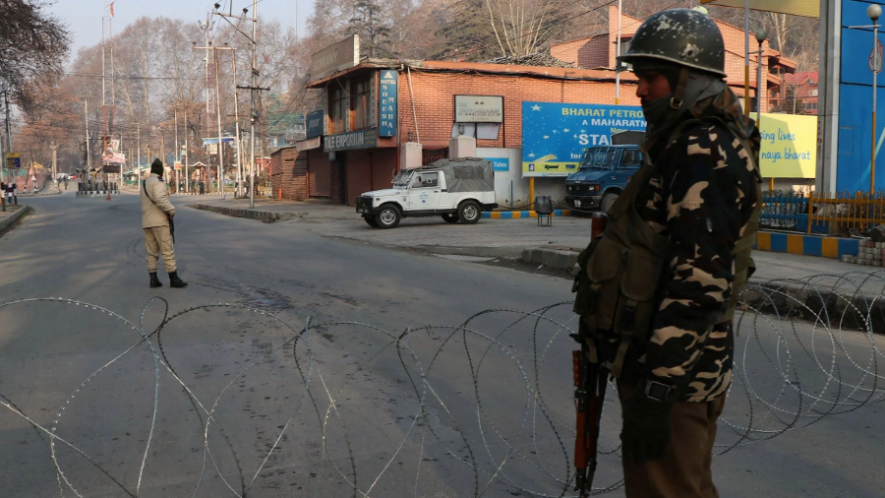Foreign policy: Who Is Isolated

President Donald Trump’s remark, directed at Pakistan Prime Minister Imran Khan, that Prime Minister Narendra Modi had asked him two weeks ago if he “would like to be a mediator or arbitrator” on the Kashmir dispute, was a bolt from the blue. Within hours, the Indian government denied Trump’s assertion. The minister for external affairs released a statement to the Rajya Sabha that Modi had made no such request. The government also reaffirmed India’s stance that all “outstanding” issues with Pakistan are to only be discussed bilaterally.
The claim of a request for “mediation” might have been laid to rest had the government’s carefully worded statement spelt out what the “outstanding” issues are for which bilateral talks are needed with Pakistan. Indeed, to resolve any “outstanding” bilateral issues the two sides must get on the same page.
The issue is that India and Pakistan have parleyed hundreds of times despite public avowals to the contrary. The last such talk was held between the Manmohan Singh and Pervez Musharraf governments, of which a “four-point formula” was the basis. This gap between the Indian government’s public stance and its backchannel bilateral talks, held away from the public gaze, is not new.
This divergence exists even in its public stance on Kashmir, which has been marked by ambiguity. On the one hand, India insists that the only issue to discuss with Pakistan is cross-border terrorism or the proxy war and return of the territory seized in 1947-‘48. On the other hand, India insists that Jammu & Kashmir is an “integral part of India” and that outsiders have no say in the matter.
Notwithstanding this mismatch, there is no gainsaying the fact that a wide gulf between the two countries persists, and neither bilateralism nor unilateralism have resolved their 72-year-old dispute over Kashmir. This inability to solve the dispute is a compelling reason to break away from existing approaches, which have failed to deliver.
It must be kept in mind that bilaterailism has not succeeded because neither side trusts the other. As for unilateralism, the ham-handed manner of approaching this dispute has made the situation worse. The ruling party has been pushing for greater control over mosques, madrasas and the media. This is precisely what a report prepared by the Ministry of Home Affairs had advocated in February 2017.
While the Indian government peddles the line that a solution is around the corner, and that the ground situation remains grim, there are other factors to be kept in mind.
The most compelling of them is that the United States-Russia-China and Pakistan are on the same page as far as the Afghan peace process is concerned. For all India’s claims that it has isolated Pakistan, it is India which is left high and dry.
India’s insistence on an ‘Afghan-owned and Afghan led’ peace process lies shattered. For all the praise showered on it for investing $3 bn in Afghanistan, India’s isolation is apparent from another recent development. The US special envoy on the Afghan peace process simply did not brief India. Instead, India had to be content with a briefing from the German envoy. And Germany has only a marginal role in the Afghan peace process.
It is Pakistan’s clout with the Taliban that has forced the US to seek to repair ties with it. Paradoxically, Pakistan’s significance was increased when India kowtowed to the US sanctions on Iran. The sanctions not only cut supplies of relatively inexpensive oil from Iran but also put a spoke in India’s push for the International North-South Transport Corridor (INSTC).
This corridor would bring India closer to the burgeoning trade and commerce in Eurasia but by succumbing to US pressure, the Chahbahar port and the road connecting India to Afghanistan via the Iranian port of Chabahar are also imperilled. With no sign of a thaw in the US push against Iran India will have to consider opening road connectivity to Afghanistan and Central Asia via Pakistan.
The Afghan peace process, spearheaded by the Quadrilateral—the US, Russia, China and Pakistan—is making headway. Meanwhile, India stands isolated from the process. This is another reason for Indian policy makers to re-think their policy on Pakistan.
The most pressing reason to reach out to Pakistan is the presence of 7,000-8,000 foreign militants in Afghanistan belonging to Al Qaeda and the IS or ‘Islamic State’. Both Russia and China consider Taliban their best bet in order to contain foreign militants, lest they make their way to Xinjiang and/or Chechnya in their respective countries. The fact that the Taliban, howsoever reactionary, wants to get rid of foreign forces is being considered a solid reason to engage with them, particularly to confront and defeat the Qaeda and IS.
This holds true for India as well. The Indian government is doing its best to queer the pitch for dispute resolution. India’s Kashmir policy is veering towards creating divisions among the Muslims, along sectarian or ethnic lines such as Shia, Bakerwal, Gujjar, Pahadi and so on. These groups are being targeted for preferential treatment in order to weaken what the central government officials call “Sunni Kashmiri” dominance.
At the same time, under President’s Rule, military suppression has picked up. Pro-autonomy and pro-Azaadi leaders and activists are either being arrested and implicated in “terror-funding” cases or for their role in resisting and countering repression.
The real objective behind all this is to pave the way for a BJP-led government in Jammu and Kashmir. State Governor Satyapal Malik rages every now and then against corruption but his administration is unveiling another policy to co-opt or create new power brokers and power-wielders in Kashmir. (X)
When the status quo is disrupted and the administration and military are engaged in bringing about BJP rule in the state, there is no denying that it will create a fertile ground for Al Qaeda and IS militants to hunt in. The increased frequency of Al Qaeda and IS statements, added to their proximity to Kashmir, makes this scenario likely.
India’s security and strategic experts claim that they are prepared to face this threat. But they have also been simultaneously warning of the threat to India posed by Al Qaeda and IS elements operating in Afghanistan.
This possible scenario, as well as the dire need to restore road connectivity to Afghanistan, the Central Asian republics and Eurasia through the INSTC, are compelling reasons why India needs Pakistan’s help in reaching an understanding with Taliban.
The difficulty is that an ideologically driven government in India is refusing to accept that what it is initiating in Kashmir is fraught with danger. This may benefit the ruling party but irreparably harm the country. Indians gloated over the reported isolation of Pakistan over Masood Azhar and Hafeez Saeed. We were slow to realise we stand isolated today in the Afghan peace process.
There are many reasons to be wary of the US playing any mediatory role in Kashmir, but this does not mean India cannot acknowledge that a third country’s assistance is required to prevent Al Qaeda and IS from gaining ground in J&K. Should that come to pass, the fight for ‘Azaadi’ or Autonomy will be replaced by a fight to establish an Islamic caliphate. In other words, it is not the indigenous militancy fighting for freedom from India which is fanatic and poses a potentially existential threat to India. It is the prospect of Al Qaeda and IS spreading to the sub-continent that is the real threat. Read together with being cut off from central Asia and INSTC, India’s room for manoeuvring will be drastically curtailed.
Should good sense prevail, India’s rulers would realise the suitability of—and need to—talk to Pakistan.
The writer’s views are personal.
Get the latest reports & analysis with people's perspective on Protests, movements & deep analytical videos, discussions of the current affairs in your Telegram app. Subscribe to NewsClick's Telegram channel & get Real-Time updates on stories, as they get published on our website.
























